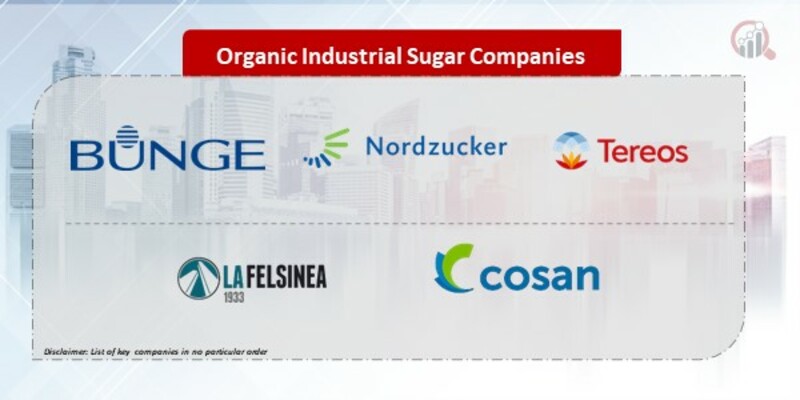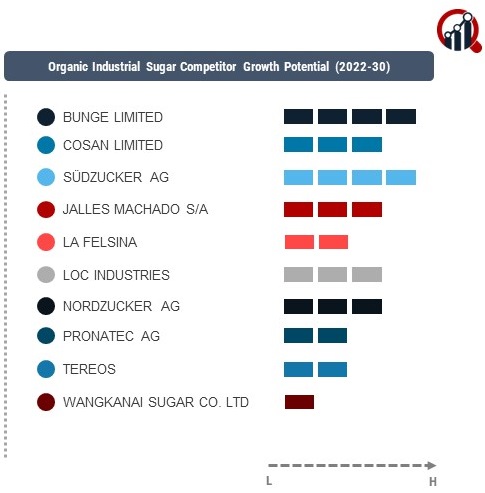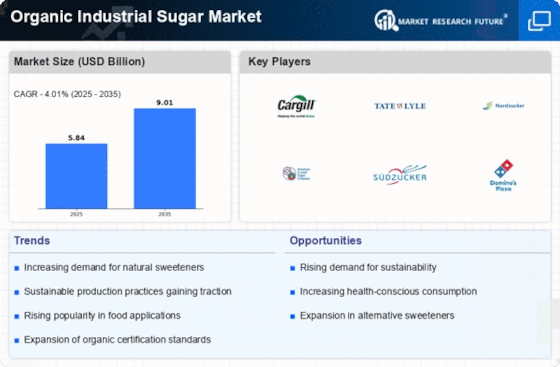Top Industry Leaders in the Organic Industrial Sugar Market

Strategies Adopted by Organic Industrial Sugar Key Players
The organic industrial sugar market has witnessed notable growth in recent years, driven by increasing consumer awareness of the benefits of organic products and a rising demand for sustainable and eco-friendly ingredients in the food and beverage industry. In examining the competitive landscape of this market, key elements such as key players, strategies adopted, market share analysis, new and emerging companies, industry news, investment trends, overall competitive scenario, and recent developments in 2023 need to be considered.
List of Key Players
The landscape of the organic industrial sugar market is marked by the presence of key players that have established a robust position globally. Major contributors to the market include companies such as
- Bunge Limited
- Cosan Limited
- Südzucker AG
- Jalles Machado S/A
- La Felsina, LOC Industries
- Nordzucker AG
- Pronatec AG
- Tereos,
- Wangkanai Sugar Co. Ltd s
These companies boast extensive distribution networks, diverse product portfolios, and adherence to organic standards, making them influential players in the organic industrial sugar segment.
Key players in the organic industrial sugar market are adopting strategic measures to maintain and enhance their market positions. One prominent strategy is the expansion of production capacity to meet the growing demand for organic industrial sugar. Companies like Südzucker AG have invested in upgrading their facilities to scale up production, ensuring a consistent and reliable supply to their customers. Additionally, there is a focus on sustainability initiatives, including the adoption of eco-friendly farming practices and certifications to appeal to environmentally conscious consumers.
Factors for Market Share Analysis
Several factors contribute to the analysis of market share within the organic industrial sugar sector. Product quality, pricing strategies, adherence to organic standards, global reach, and responsiveness to market demands are among the key factors. Companies that successfully navigate these aspects tend to secure a larger market share. The ability to establish partnerships and collaborations along the supply chain also plays a pivotal role in determining market share, as it contributes to a more robust and resilient business model.
New and Emerging Companies
In addition to established players, the organic industrial sugar market is witnessing the emergence of new and innovative companies. These entrants often focus on niche segments or offer unique value propositions. For example, startups like Wholesome Sweeteners and Organics Unlimited have gained traction by specializing in organic and fair-trade sugar, catering to consumers who prioritize ethical and socially responsible products. The entry of such companies intensifies competition and fosters innovation within the market.
Industry News and Current Company Updates
Recent industry news highlights a growing emphasis on sustainable and ethical sourcing practices in the organic industrial sugar market. Companies like Florida Crystals Corporation have garnered attention for their commitment to fair labor practices and environmentally friendly farming methods. Additionally, there is a notable trend of partnerships between sugar producers and food and beverage manufacturers to ensure a transparent and traceable supply chain, meeting the increasing consumer demand for product origin information.
Investment Trends
Investment trends in the organic industrial sugar market are reflective of the industry's growth trajectory. Investors are showing keen interest in companies that align with sustainability goals and have a strong commitment to organic practices. The capital influx is often directed towards expanding production capacity, improving processing technologies, and enhancing supply chain transparency. Notably, investments in research and development to explore sustainable farming practices and innovative sugar extraction methods are gaining prominence.
Overall Competitive Scenario
The overall competitive scenario in the organic industrial sugar market is dynamic, with a mix of established giants and agile newcomers. The market's competitiveness is heightened by factors such as changing consumer preferences, evolving regulatory landscapes, and a global shift towards sustainability. Larger players leverage their economies of scale, while smaller companies focus on agility and niche positioning. The competition is not only confined to product quality and pricing but extends to broader aspects of corporate social responsibility, environmental sustainability, and transparency in the supply chain.
Recent Developments
The organic industrial sugar market experienced several noteworthy developments. One significant trend was the increasing demand for organic industrial sugar in the beverage industry. With a rising preference for healthier and organic alternatives, beverage manufacturers globally sought to replace traditional sweeteners with organic industrial sugar. This shift led to strategic collaborations between sugar producers and beverage companies to secure a stable supply chain and meet the surging demand.
Moreover, there was a notable surge in consumer awareness regarding the environmental impact of sugar production. In response, key players intensified their efforts to implement sustainable farming practices, reduce carbon footprints, and engage in responsible water management. This focus on environmental sustainability not only addressed consumer concerns but also positioned companies favorably in the competitive landscape.
Furthermore, 2023 saw advancements in technology for sugar processing. Companies invested in modernizing their manufacturing facilities to enhance efficiency, reduce waste, and ensure the production of high-quality organic industrial sugar. The integration of automation and digitalization in processing plants became a key strategy to streamline operations and maintain competitiveness in the market.












